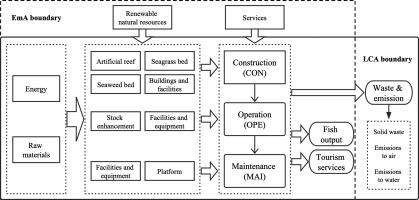Science of the Total Environment ( IF 8.2 ) Pub Date : 2022-09-28 , DOI: 10.1016/j.scitotenv.2022.159102 Ye-Cheng Wang 1 , Yuan-Wei Du 2

|
Resources and environmental carrying capacity (RECC) describes the ability of a system to achieve healthy and sustainable development. Various marine ranching enterprises have emerged in China in recent years, which have aroused concern and debate about the RECC of marine ranching systems. By taking the environmental impact calculated by life cycle assessment (LCA) into consideration in emergy analysis (EA), this study evaluated the comprehensive RECC performance of the whole system and each stage of a marine ranching system in China. The resource use efficiency (RUE) and system carrying ratio (SCR) of the system were reasonably good. However, its environmental loading ratio (ELR), emergy yield ratio (EYR), and emergy sustainability index (ESI) were unsatisfactory. First, the nonrenewable resources dominated the emergy input. Second, the emergy input from the purchased resources was much greater than that of local resources. Third, the potential environmental impact mainly came from the construction stage. Fourth, serious overload of RECC was observed in the maintenance stage. The results indicate that the system is efficient, and its RECC is in a safe state, but the system has deficiencies in environmental protection and the exploitation and utilization of local resources. The proposed analysis framework helps us comprehensively understand the marine ranching RECC performance and provides a research paradigm reference for the sustainability analysis of other complex eco-economic systems.































 京公网安备 11010802027423号
京公网安备 11010802027423号